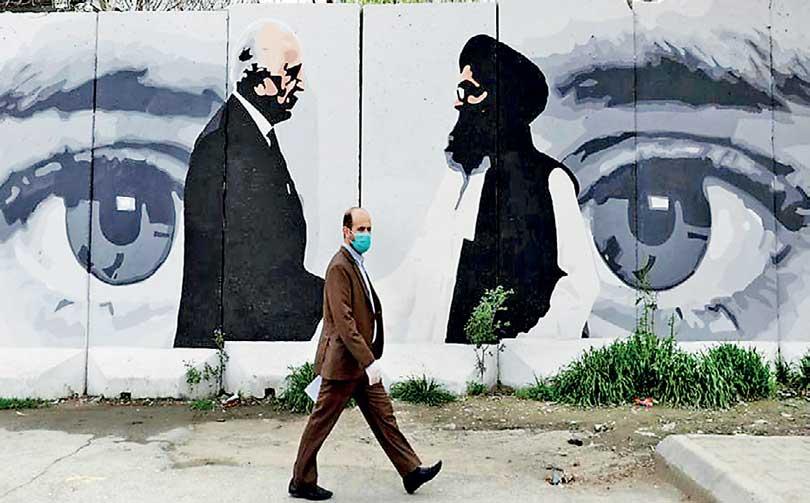Reply To:
Name - Reply Comment
 The pact signed by the United States and the Afghan insurgent group the Taliban in Doha, the capital of Qatar on February 29, 2020, embodied certain commitments from the two sides.The US was to withdraw its troops from Afghanistan and desist from interfering in the functioning of the “post-settlement Islamic government” in that country, and the Taliban were to cut off all links with organizations like the al-Qaeda which pose a threat to the US and to disallow the activities of such outfits on Afghan soil.
The pact signed by the United States and the Afghan insurgent group the Taliban in Doha, the capital of Qatar on February 29, 2020, embodied certain commitments from the two sides.The US was to withdraw its troops from Afghanistan and desist from interfering in the functioning of the “post-settlement Islamic government” in that country, and the Taliban were to cut off all links with organizations like the al-Qaeda which pose a threat to the US and to disallow the activities of such outfits on Afghan soil.
 But the Doha pact appears to be floundering, though none of the parties is saying so. The US has indeed reduced its troop strength from 13, 000 to 8600, but last Thursday and Friday it launched air attacks on Taliban positions in response to Taliban attacks which had resulted in the death of 10 Afghan government troops. Meanwhile, the Taliban are continuing to maintain links with the Al Qaeda and kindred anti-US outfits like the HaqqaniNetwork.
But the Doha pact appears to be floundering, though none of the parties is saying so. The US has indeed reduced its troop strength from 13, 000 to 8600, but last Thursday and Friday it launched air attacks on Taliban positions in response to Taliban attacks which had resulted in the death of 10 Afghan government troops. Meanwhile, the Taliban are continuing to maintain links with the Al Qaeda and kindred anti-US outfits like the HaqqaniNetwork.
A recent report of the UN Analytical Support and Sanctions Monitoring Team (ASSMT) shows that thanks to the hospitality of the Taliban, al-Qaeda still has 400 to 600 operatives active in 12 Afghan provinces, and running training camps in the east. The Taliban were consulting al-Qaeda senior leaders throughout their 16 months of peace talks with the US. They had assured Al-Qaeda chief Ayman al-Zawahiri, that they would never break their “historical ties”with the Al-Qaeda.
The UN report says that the Taliban remain focused on taking Afghanistan back to a harsh form of Islamic rule
The Trump Administration had rushed into a politically expedient deal that negotiators knew was doomed to fail. According to Time magazine,the US Central Command’s Gen.Frank McKenzie had warned the Senate Armed Services Committee on March 13 about Taliban’s perfidiousness. “We don’t need to trust them, we don’t need to like them, we don’t need to believe anything they say. We need to observe what they do,” McKenzie said.
Time warned that US withdrawal would result in Afghanistan’s return to the era prior to 9/11 when the al-Qaeda plotted the 2001 attacks sitting there. The UN report says that theTaliban remain focused on taking Afghanistan back to a harsh form of Islamic rule, and are employing tactics to delay intra-Afghan talks to get the maximum number of US troops to withdraw, so that they can pounce on the Afghan government forces and decimate them.
Relations between the Taliban, the Haqqani Network and al-Qaeda remain close, based on friendship, a history of shared struggle, ideological sympathy and intermarriage, the UN report said. It recalls that in the 1990s, Al-Qaeda had pledged fealty to the Taliban leader Mullah Omar, declaring him the “Emir of the Faithful.”In April 1998, they had told the then US envoy in the UN, Bill Richardson, that Osama bin Laden was not a threat to the US, which is what the Taliban are saying even now. According to Thomas Joscelyn of the Foundation for Defence of Democracies’ Long War Journal, Ayman al-Zawahiri, the current head of al-Qaeda, has pledged fidelity to the Taliban chief Haibatullah Akhundzada.
“Al Qaeda’s core is in Afghanistan”, says Prof. Rohan Gunaratna

Graffitti in Kabul showing US negotiator Zalmay Khalilzad meeting a Taliban leader
Excerpts from an interview the Sri Lanka-born Al Qaeda expert, Prof. Rohan Gunaratna who authored Inside al Qaeda; Global Network of Terror (Columbia University Press, New York):
 Q What is your assessment of the threat from Al Qaeda post Osama bin Laden?
Q What is your assessment of the threat from Al Qaeda post Osama bin Laden?
Prof. Gunaratna:The mother-ship of the Islamic State, the Al Qaeda, is on the march. Both in Afghanistan and worldwide, Al Qaeda and its associates are remerging. In parts of Asia, Africa and the Middle East, Al Qaeda is reasserting itself. Although its biggest strength is in Syria, Hay’atTahrir al-Sham (with 12,000 fighters), its core is in Afghanistan. Away from the glare of the Intelligence community, al Qaeda has rebuilt a formidable structure in Afghanistan. The Taliban, the erstwhile ruler of Afghanistan, are hosting the Al Qaeda.
Since it mounted the 9/11 attack, focused US-led coalition military operations had depleted Al Qaeda’s numerical strength from 3000 to about 100 members. But Al Qaeda survived in pockets in neighbouring countries, in Iran and Pakistan and are growing.
While its leader Osama bin Laden was killed in Abbotabad in Pakistan, the outfit under Dr.Ayman al-Zawahiri has survived. Dr. al-Zawahiri maintains a close relationship with Haibatullah Akhundzada, the current leader of the Taliban.
Q What is the current strength of the Al Qaeda?
Prof.Gunaratna: Today, the security and Intelligence community assess the numerical strength of the Al Qaeda core at 400-600 and its affiliates at over 100,000, the largest being the Afghan Taliban. Its affiliates include al Shabab, Al Qaeda in Arabian Peninsula, Al Qaeda Islamic Maghreb, East Turkestan Islamic Movement, and Jemaah Islamiyah. Operating in the shadow of the Taliban in Afghanistan,Al Qaeda has creating not only an infrastructure in Afghanistan, but worldwide by expanding its alliances.
Working with Mawlawi Hamidullah Akhundzada, the Al Qaeda established a training infrastructure in the south and east of Afghanistan. Its trainees and trainers are protected by Mufti Mahmood. It also advised and assisted the Taliban offensive against Ghazni City in August 2018.
According to the UN monitoring committee report, Al Qaeda held meetings in 2019 and in early 2020 to discuss cooperation with the Taliban in the field of operational planning, training and provision by the Taliban of safe havens for the Al-Qaida in Afghanistan. Al-Qaida is covertly active in the following 12 provinces: Badakhshan, Ghazni, Helmand, Khost, Kunar, Kunduz, Logar, Nangarhar, Nimruz, Nuristan, Paktiya and Zabul.
According to the UN Team, Al Qaeda has met Ahmad al-Qatari, Sheikh Abdul Rahman, Hassan Mesri (aka Abdul Rauf), and Abu Osman, a Saudi. The Monitoring Team was informed of six reported meetings between Al-Qaida and the Taliban senior leadership in the past 12 months. The most notable of these was in spring 2019 in the Sarwan Qal‘ah District of Helmand Province. In this ,Sadr Ibrahim, Mullah Mohammadzai and former adviser to Mullah Mohammad Omar, Gul Agha Ishakzai,reportedly met with Hamza Usama Muhammad bin Laden, to reassure him personally that the Islamic Emirate would not break its “historical ties with Al-Qaida for any price.” Hamza Usamawas subsequently killed in a US attack.
Q What exactly is Al Qaeda’s expertise?
Prof.Gunaratna: Given their competence in training and operations, especially suicide attacks, the Haqqani Network and Al Qaeda partner to train other groups and also mount operations. They are also political consultants for the Taliban. The UN monitoring committee reported that Hafiz Azizuddin Haqqani and Yahya Haqqani consulted al-Zawahiri over the agreement with the United States and the peace process. Yahya Haqqani has been the primary Haqqani Network focal point for liaison with Al-Qaida since mid-2009.
 Q What is the reaction of the Taliban to the UN’s charges against it?
Q What is the reaction of the Taliban to the UN’s charges against it?
Prof.Gunaratna: According to the Taliban, the UN’s charge that it is in cahoots with the Al Qaeda is a fabrication. Its Arabic website said on June 3, that the report was “unfounded and lacking in facts.” It charged that the UN is unable to fulfill its part of the Doha Agreement which was to remove Taliban leaders and members from the sanctions list.
Q What is the future for Afghanistan, with President Trump set to deplete US forces by November?
He is reportedly contemplating a total withdrawal from a war which has cost US$ 132 billion and more than 3000 US and coalition lives so far.
Prof.Gunaratna: A resurgent Al Qaeda presents a formidable threat to the world. Unless its sanctuary is degraded and disrupted in Afghanistan, it is very likely that Al Qaeda will continue to grow in strength, size and influence in the coming months and years. The greater threat will be Afghanistan’s reemerging as an alternative to Syria and Iraq and Al Qaeda training the next generation of terrorists